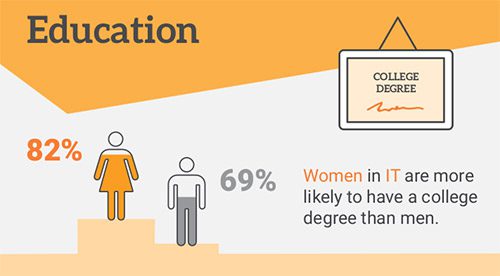Spiceworks today released the results of its latest survey, which reveals that the gender pay gap also affects women with careers in IT.
The IT management software provider and network of technology professionals recently polled 600 IT workers in the U.S. and found that 82 percent of female respondents have a college degree, having completed an associate’s degree or higher. By comparison, sixty-nine percent of males have a college degree. Among all IT workers with a degree, computer and information sciences degrees were the most common (71 percent).

Despite the educational edge, women are often being paid less than men.
Full-time women IT workers get six percent less in compensation than men. Spicework’s study notes that the pay gap is narrower in IT than in other careers, citing data from the U.S. Census Bureau. Across all industries, women typically take home paychecks that are 20 percent smaller than those of their male colleagues.
Tech-savvy women are also likelier to become “accidental IT pros,” with 53 percent of women falling into the role compared to 26 percent of men. In fact, 29 percent of all respondents said they never intended to pursue a career in IT. Yet most folks plan on sticking with their IT careers for the long haul (66 percent).
Although IT skills are in demand and can often lead to well-paying jobs, Spiceworks’ data suggests that not all technology professionals are living large.
Most IT professionals earn less than $75,000 a year and only three percent take home salaries in six-figure range. Ten percent said they make between $75,000 and $99,999 per year while 34 percent said they earned between $50,000 and $74,999. Another 34 percent said they took home between $35,000 and $49,999. Seventeen percent earn less than $35,000 a year.
In the end, many IT professionals are disappointed with how little they’re getting paid. Forty-one percent of respondents said they weren’t being compensated fairly.
“CIOs and IT managers are largely responsible for staffing their organizations with skilled tech workers. However, IT skills are currently in high demand, so retaining top tech talent is becoming more of a challenge,” Peter Tsai, senior technology analyst at Spiceworks, told Datamation. “The fact is the job market currently favors tech workers, and many of them feel underpaid.”
Business leaders seeking to retain skilled IT workers in a competitive job market may want to start tackling wage equality at their organizations.
“The compensation disparity between what IT pros make now and what they could earn elsewhere is especially evident among women in IT due to the current gender pay gap,” Tsai continued. “Therefore, unless companies are willing to compensate appropriately based on IT skills and experience, and without bias toward gender, they run the risk of having IT talent jump ship in search of greener and higher-paying pastures.”
Pedro Hernandez is a contributing editor at Datamation. Follow him on Twitter @ecoINSITE.
Huawei’s AI Update: Things Are Moving Faster Than We Think
FEATURE | By Rob Enderle,
December 04, 2020
Keeping Machine Learning Algorithms Honest in the ‘Ethics-First’ Era
ARTIFICIAL INTELLIGENCE | By Guest Author,
November 18, 2020
Key Trends in Chatbots and RPA
FEATURE | By Guest Author,
November 10, 2020
FEATURE | By Samuel Greengard,
November 05, 2020
ARTIFICIAL INTELLIGENCE | By Guest Author,
November 02, 2020
How Intel’s Work With Autonomous Cars Could Redefine General Purpose AI
ARTIFICIAL INTELLIGENCE | By Rob Enderle,
October 29, 2020
Dell Technologies World: Weaving Together Human And Machine Interaction For AI And Robotics
ARTIFICIAL INTELLIGENCE | By Rob Enderle,
October 23, 2020
The Super Moderator, or How IBM Project Debater Could Save Social Media
FEATURE | By Rob Enderle,
October 16, 2020
FEATURE | By Cynthia Harvey,
October 07, 2020
ARTIFICIAL INTELLIGENCE | By Guest Author,
October 05, 2020
CIOs Discuss the Promise of AI and Data Science
FEATURE | By Guest Author,
September 25, 2020
Microsoft Is Building An AI Product That Could Predict The Future
FEATURE | By Rob Enderle,
September 25, 2020
Top 10 Machine Learning Companies 2020
FEATURE | By Cynthia Harvey,
September 22, 2020
NVIDIA and ARM: Massively Changing The AI Landscape
ARTIFICIAL INTELLIGENCE | By Rob Enderle,
September 18, 2020
Continuous Intelligence: Expert Discussion [Video and Podcast]
ARTIFICIAL INTELLIGENCE | By James Maguire,
September 14, 2020
Artificial Intelligence: Governance and Ethics [Video]
ARTIFICIAL INTELLIGENCE | By James Maguire,
September 13, 2020
IBM Watson At The US Open: Showcasing The Power Of A Mature Enterprise-Class AI
FEATURE | By Rob Enderle,
September 11, 2020
Artificial Intelligence: Perception vs. Reality
FEATURE | By James Maguire,
September 09, 2020
Anticipating The Coming Wave Of AI Enhanced PCs
FEATURE | By Rob Enderle,
September 05, 2020
The Critical Nature Of IBM’s NLP (Natural Language Processing) Effort
ARTIFICIAL INTELLIGENCE | By Rob Enderle,
August 14, 2020

Datamation is the leading industry resource for B2B data professionals and technology buyers. Datamation's focus is on providing insight into the latest trends and innovation in AI, data security, big data, and more, along with in-depth product recommendations and comparisons. More than 1.7M users gain insight and guidance from Datamation every year.
Advertise with TechnologyAdvice on Datamation and our other data and technology-focused platforms.
Advertise with Us
Property of TechnologyAdvice.
© 2025 TechnologyAdvice. All Rights Reserved
Advertiser Disclosure: Some of the products that appear on this
site are from companies from which TechnologyAdvice receives
compensation. This compensation may impact how and where products
appear on this site including, for example, the order in which
they appear. TechnologyAdvice does not include all companies
or all types of products available in the marketplace.